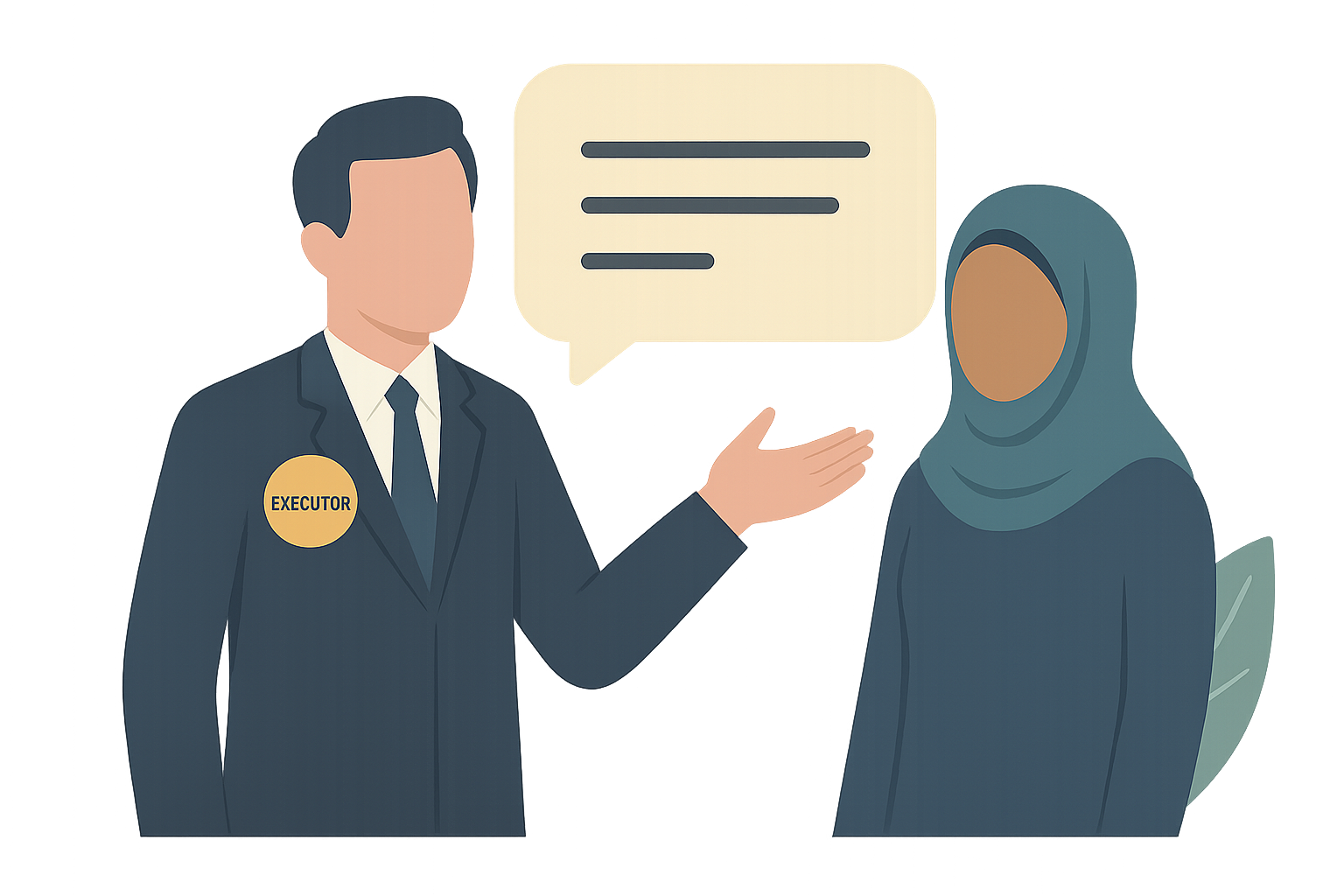In Australia, the role involves a dual obligation: navigating the legal framework of the Australian probate system while ensuring the distribution aligns with Islamic principles. This unique combination requires a thorough understanding of both legal and religious obligations to properly honour the intentions of the will-maker.
The Role of Executors in Islamic Wills
- Go Lawyers
Executor in Islamic Wills
A Critical Appointment for Faithful and Lawful Estate Administration
In the context of Islamic wills, appointing a trustworthy and capable individual is essential to ensuring your final wishes are honoured both spiritually and legally. This person acts as your representative after death, entrusted with the sacred and legal responsibility of administering your estate, settling debts, and distributing assets according to Shariah and Australian law. Understanding their role, duties, and ideal qualifications can safeguard your legacy from confusion or dispute.
WHO CAN BE AN EXECUTOR?
A trusted adult with strong ethics, ideally a practising Muslim, can act as executor. Legal and religious suitability is key.
DUTIES OF AN EXECUTOR UNDER ISLAMIC LAW
From paying debts to distributing assets, executors must uphold both Australian legal standards and Shariah inheritance rules.
CHALLENGES EXECUTORS MAY FACE
Managing disputes, cross-border assets, and religious obligations can be complex. Professional guidance helps ensure smooth administration.

What Is an Islamic Will?
In the realm of estate planning, understanding the role of an executor in Islamic wills is crucial. An executor is responsible for ensuring that the wishes of the deceased, as outlined in their will, are carried out by Islamic law.
An Islamic will, or “wasiyyah,” is a legal document that allows a Muslim to outline how they want their estate to be distributed after their death.
This will is guided by Sharia law, which provides specific rules on inheritance to ensure fairness and justice. The will can cover various aspects, including the distribution of assets, care of minor children, and any charitable donations.
Importance of Having an Islamic Will
Having an Islamic will is essential for Muslims as it ensures that their estate is distributed in accordance with Islamic principles. It helps prevent disputes among heirs and ensures that the deceased’s wishes are respected. Furthermore, it allows for the distribution of up to one-third of the estate to non-heirs or charitable causes, providing an opportunity to support causes that were important to the deceased.
Who Is an Executor?
An executor is a person appointed by the will-maker to carry out the terms of the will. In the context of an Islamic will, the executor must ensure that the estate is distributed according to Sharia law. This role is vital to ensure that the deceased’s wishes are fulfilled, and any debts or obligations are settled.
- let’s navigate your path forward together.
Appointing an Executor? We’ll Help You Choose Wisely.
Get trusted legal and Islamic guidance to appoint the right person. Ensure your estate is managed with fairness, clarity, and religious integrity.
Qualities of a Good Executor
Choosing the right person to carry out your final wishes is crucial for the smooth execution of a will. The ideal candidate should possess several important qualities:
Trustworthiness: This individual must be someone the will-maker trusts fully, as they will have significant authority over the management and distribution of the estate.
Organised and Detail-Oriented: Handling an estate involves meticulous attention to records, deadlines, and documentation, making strong organisational skills essential.
Knowledgeable: A solid grasp of Islamic inheritance laws—or at least the willingness to seek expert guidance—is important to ensure the estate is distributed in line with Shariah.
Communication Skills: They should be capable of engaging respectfully and clearly with both beneficiaries and legal professionals to minimise misunderstandings or conflict.
Responsibilities of an Executor in Islamic Wills
They play a pivotal role in managing the estate, and their responsibilities can be broadly categorised as follows:
Ensuring Compliance with Islamic Law
The primary responsibility in managing a will under Islamic law is to ensure that the estate is distributed according to the specified shares outlined in the Quran. This includes allocating assets correctly among lawful heirs and ensuring that any bequests to non-heirs or charitable causes remain within the one-third discretionary limit. The person carrying out this task must uphold both the religious and legal standards essential to the will’s validity.
Settling Debts and Obligations
Before any estate can be distributed, it is essential to settle all debts and obligations of the deceased. This includes repaying loans, clearing outstanding bills, and addressing religious duties such as any unpaid Zakat. Fulfilling these commitments ensures the estate is purified and ready for lawful distribution under Islamic principles.
Managing and Distributing the Estate
Managing the estate until full distribution is a critical responsibility. This involves tasks such as collecting and valuing assets, paying any applicable taxes, and ensuring the proper transfer of assets to rightful heirs. The entire process must be handled with transparency and fairness to uphold both legal and ethical standards.
Handling Legal and Administrative Tasks
The executor is also responsible for handling any legal and administrative tasks related to the estate. This may include obtaining probate, filing necessary tax returns, and keeping detailed records of all transactions.
The Role of Executors in Islamic Wills in Australia
Legal Considerations
Executors must be aware of the legal requirements in Australia, such as obtaining probate, which is the legal authority to manage the deceased’s estate. They must also ensure that all taxes and debts are paid before distributing the assets to beneficiaries.
Cultural Sensitivity
In addition to legal responsibilities, those managing an estate in Australia must also be culturally sensitive to the needs of Muslim families. This includes respecting Islamic funeral rites and ensuring the timely distribution of the estate by religious expectations.
Challenges Faced by Executors
Taking on the role can be challenging, particularly when dealing with complex estates or sensitive family dynamics. Common difficulties include managing estates with multiple properties, businesses, or international assets; navigating family disputes that may arise during distribution; and balancing compliance with both Australian law and Sharia principles. In such cases, the appointed executor must be prepared to seek both legal and religious guidance to fulfil their responsibilities effectively.
Conclusion
The role of an executor in Muslim wills is both significant and challenging. Executors have the responsibility to ensure that the deceased’s wishes are carried out following Islamic principles while adhering to local legal requirements. By choosing a trustworthy and capable executor, individuals can ensure that their estate is managed and distributed fairly and efficiently. Executors should seek guidance when needed to navigate the complexities of Islamic inheritance law and the legal landscape in Australia.
Understanding the role of an executor is essential for ensuring that the estate planning process aligns with both religious and legal standards. By fulfilling these responsibilities diligently, executors can honour the wishes of the deceased and provide peace of mind to the family.
- Expert Mediation Services
Find Resolution, Not Conflict
Disputes don’t have to lead to lengthy court battles. At Go Lawyers, our mediation lawyer services provide a practical and efficient way to resolve conflicts. Our experienced team fosters constructive dialogue to achieve fair and mutually beneficial outcomes, whether it's family mediation, business disputes, or transactional issues.
Let us guide you toward a solution that prioritises your interests while preserving relationships.
- Why Choose Go Lawyers?
Professional Lawyers who offer a fixed, fair price
Whether you are an individual, a business owner, or part of a giant corporation, our experienced team delivers solutions that protect your interests and drive results. From drafting contracts and negotiating agreements to resolving disputes through mediation or litigation, we handle every aspect of your legal needs professionally and carefully.
We understand the importance of clear communication and cost-effective services, so we prioritise transparency and efficiency. Our team possesses expertise in risk management, compliance, and the resolution of commercial disputes, allowing you to depend on us as a reliable partner throughout the entire process.
